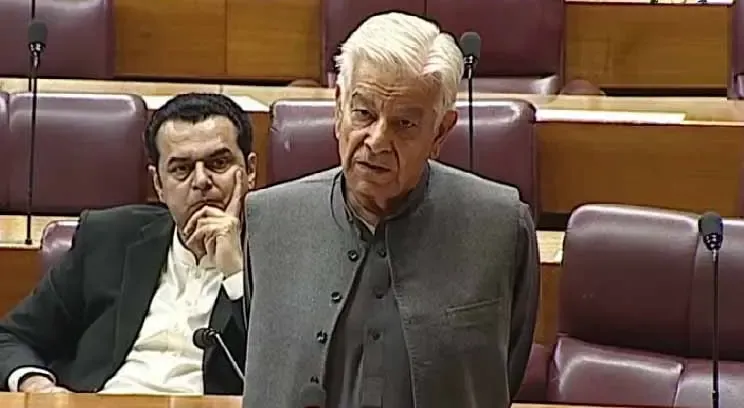What Warning Did Pakistan's Defence Minister Issue Regarding Afghanistan?

Synopsis
Key Takeaways
- Pakistan and Afghanistan are engaged in renewed peace talks in Istanbul.
- Khawaja Asif has warned of potential conflict if negotiations fail.
- A third-party oversight structure involving Turkey and Qatar may be established.
- The threat from Tehreek-i-Taliban Pakistan (TTP) remains a focal point of discussions.
- Relations have been strained by recent military activities along the Durand Line.
Istanbul, Oct 25 (NationPress) Pakistan and Afghanistan have initiated the second round of peace negotiations in Istanbul on Saturday. During this, the Defence Minister of Pakistan, Khawaja Asif, has reportedly maintained an aggressive stance, warning Kabul of the potential for an "open war" if these discussions do not yield positive results.
The initial round of talks took place in Doha on October 18-19, with mediation from Qatar and Turkey.
The Afghan delegation is headed by Deputy Interior Minister Rahmatullah Mujib, which includes Anas Haqqani, the brother of the Afghan Interior Minister Noor Ahmad Noor. Pakistan's representation consists of two security officials.
On Saturday, Defence Minister Khawaja Asif, who spearheaded the previous discussions, indicated in Sialkot that the results of this fresh dialogue round would likely be disclosed by Sunday.
He stated, "If the dialogue fails, Pakistan may have no option but to engage in open conflict with Afghanistan. However, both parties seem inclined towards peace." This was reported by Pakistan's Daily Times.
Reports suggest that Islamabad is also keen to establish a "third-party oversight structure", potentially co-chaired by Turkey and Qatar, to monitor progress and address any instances of non-compliance.
During these discussions, Pakistan is anticipated to demand substantial and verifiable commitments from Afghanistan to eradicate the threat posed by the outlawed Tehreek-i-Taliban Pakistan (TTP) from its territory, which Pakistan alleges is using Afghan soil for cross-border attacks, as highlighted by the prominent daily 'Dawn'.
Recent weeks have seen turbulent relations between Kabul and Islamabad, particularly around the Durand Line, which has experienced multiple clashes.
The recent week-long visit of Afghanistan's Foreign Minister Amir Khan Muttaqi to New Delhi starting October 9 was met with extreme disapproval from the Pakistani establishment. Notably, on the first day of Muttaqi's visit, Kabul experienced drone attacks.
In a response to the stalled Indus Water Treaty following a Pakistan-sponsored terror attack in Pahalgam on April 22, Afghanistan has unveiled its intentions to construct dams on the Kunar River as promptly as possible, which is expected to cause concern in Islamabad.
On X, Muhajer Farahi, the Taliban's Deputy Information Minister, announced that Taliban Supreme Leader Hibatullah Akhundzada has directed the Ministry of Water and Energy to commence dam construction on the Kunar River immediately and to engage domestic companies rather than waiting for foreign firms.
This development follows a ceasefire agreement reached between the two nations after days of hostilities.
The Chitral River, known in Afghanistan as the Kunar River, spans 480 kilometers, flowing through northern Pakistan and eastern Afghanistan. It originates from the Chiantar glacier at the Gilgit Baltistan and Chitral border in Pakistan.
As it crosses into Afghanistan at Arandu, it is referred to as the Kunar River, eventually merging with the Kabul River in Nangahar Province. This river system is sustained by the melting glaciers and snow from the Hindu Kush mountains.









